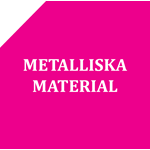Projektinitiativ inom: Skärande och icke mekanisk bearbetning
Projektinitiativpresentationer från programkonferensen Metalliska material 2017. Använd pilarna för att bläddra i spellistan.
Projektinitiativ #67: Förbättrad tribologisk robusthet inom bearbetning av avancerade metalliska material
Skärande bearbetning av metalliska material är en av de vanligaste metoderna för att producera komponenter. Förbättrad processtabilitet, flexibilitet och produktivitet möjliggör stora miljömässiga och ekonomiska vinster för svensk tillverkande industri.
Projektinitiativ #75: Machining guidelines i borrning och gängning av metalliska material
Stålleverantörerna ska erbjuda sina kunder machining guidelines specifika för både unika metalliska legeringar, såväl som process-know-how, inom borrning och gängning. Vi vill utveckla snabba, relevanta bearbetningstester i borrning och gängning att använda i machining guidelines för avancerade metalliska material. Vi utgår ifrån traditionell metodik med tool wear och spånbrytningstester. Därifrån vill vi utveckla statistiska redskap, t.ex. trappstegsmetodik för att effektivt differentiera ämnets borrbarhet och borrprocess.
Projektinitiativ #82: Cooling-lubrication methods to improve quality and productivity in machining
The focus is on cryogenically-assisted manufacturing processes (including combination with MQL) producing functionally superior metallic products. This multi-disciplinary research deals with the analysis of process physics and computational materials mechanics covering tribological and thermo-mechanical interactions, followed by surface integrity and characterization of functional surfaces for assessing product quality gained with advanced cooling-lubrication.
Projektinitiativ #83: Materials variation: a methodological approach to assessing machinability
We realize that with today's diversification on the supply side along with the increased level of using material recyclables, variation in material is a greater problem than ever before in the industrial end-use. The basic understanding of material variation exists, but a methodology to deal with this variation in real production is not readily available. In this research, differences in both microstructure and deformation will be investigated for different work materials: steel, cast iron, and aluminium.
Projektinitiativ #95: A framework for the physics-based estimation of tool wear in machining process
Metal cutting process is often regarded as the final step in production of industrial components, at which the parts are closely dimensioned, new features like holes, chamfers and fillets are made and the specific demands on the properties of machined surfaces are secured. In this proposal, we intend to support the development of physics-based wear models for machining applications. An assessment of the existing strategies to link microscopic calculations and empirical models used in industrial practice will be performed, together with a systematic mapping and quantification of the various sources of numerical and physical approximations that contribute to the uncertainty of the final output.

